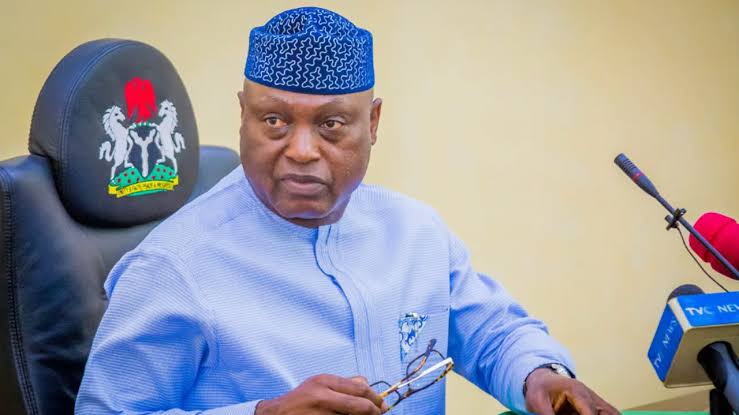Ekiti State Governor, Biodun Oyebanji, has strongly advocated for the inclusion of leadership training and mentorship into the school curriculum at every level of education across Nigeria. He emphasized that teaching leadership skills, along with associated values, would help instill the right qualities in the younger generation, ultimately addressing the leadership crisis that has long plagued the country. These remarks were made during his address at the 11th Annual Public Lecture of the Foursquare Gospel Church in Lagos, titled “Leadership in Nigeria and Its Impact on The Next Generation.”
Oyebanji, who chaired the event, underscored the importance of Nigeria adopting a forward-thinking approach to leadership development, calling for a curriculum that teaches leadership principles both as practical skills and ingrained values. He pointed out that Nigeria should be futuristic enough to prepare the younger generation for leadership responsibilities, arguing that addressing bad leadership, which he identified as the major challenge in the country, requires a well-structured, intentional program of leadership training.
The governor’s remarks were reinforced by contributions from the event’s guest speaker, Mrs. Ibukun Awosika, founder of The Chair Centre, and Lagos State Governor, Babajide Sanwo-Olu. Both emphasized the need for deliberate efforts in equipping future leaders with the necessary values and competencies for effective leadership. They all agreed that preparing young Nigerians for leadership positions should not be left to chance, and must instead be a well-planned and deliberate endeavor that starts from an early age.
Governor Oyebanji noted that leadership should be regarded as a basic skill that every citizen must possess. He compared the importance of leadership training to that of literacy and numeracy, asserting that the curriculum should embed leadership principles that will guide young people to take on leadership roles competently. “If we have identified bad leadership as the bane of the society, it is important to ensure well-structured leadership training for the younger generation,” Oyebanji remarked.
He further lamented that, for too long, Nigerians have continued to gamble with leadership selection, adopting a “trial and error” system that often sees people with no leadership aptitude or proper training thrust into positions of authority. He argued that a significant problem with leadership recruitment in Nigeria is that many leaders find themselves in power either by default, privilege, or circumstance, rather than through personal merit. In contrast, the best leaders are those who have been trained, tested, and exposed to the fundamentals of leadership, alongside their natural talents.

To this end, Oyebanji proposed that holding strategic leadership positions in society should require formal certification in leadership, given that technical skills alone are often insufficient for effective leadership. He noted that there is substantial evidence showing that job-related technical competence does not automatically translate into effective leadership. “Leadership is such a serious thing that being certified should be one of the requirements to hold certain strategic positions in the society. There is the need for real and special training in the art and science of leadership for people to succeed today,” Oyebanji said.
The governor emphasized that leadership is not merely about holding a position; it requires a deep understanding of managing diverse groups of people with differing characteristics, needs, and tendencies. According to Oyebanji, equipping leaders with the knowledge and skills necessary to handle such complexities is crucial, and this should begin as early as possible. “We all need to be well exposed to the call of leadership and how to manage a mass audience of people with differing characteristics, needs, and tendencies,” he added.
Reflecting on how this vision has shaped his administration’s policies, Oyebanji shared that his government has already begun implementing leadership education in Ekiti State through the introduction of the Ekiti Values Education (EVE) program. This initiative, integrated into the state’s curriculum, is aimed at identifying young individuals with high leadership potential and nurturing them from a young age. The governor described the EVE program as a “catch-them-young” curriculum designed to prepare future leaders for their roles from primary school.
Under the EVE program, a compulsory subject on leadership development is taught in Ekiti schools. This subject focuses on teaching the fundamental responsibilities of a leader, providing practical leadership exposure, and instilling comprehensive aspects of leadership in young students. “As a result, we currently run a compulsory subject called Ekiti Values Education (EVE) with a considerable module that focuses on leadership development. The subject aims to teach young Ekiti children comprehensive aspects of leadership, responsibility of a leader, and practical leadership exposure,” Oyebanji explained.
The governor’s sentiment was echoed by Mrs. Ibukun Awosika, who also addressed the gathering. In her presentation, Awosika highlighted the importance of nurturing a generation of empathetic and kind leaders who understand the weight of responsibility that comes with leadership. She emphasized that leaders are not necessarily the most outstanding members of society but are individuals entrusted with the responsibility to lead with empathy and wisdom.
Awosika stressed the role of parents in shaping the leadership potential of future generations, noting that children tend to grow up absorbing the values they observe in their environment. She called on parents to lead by example and teach their children what it means to be good citizens. “Raising the next generation requires our examples. We should show the younger ones what to do. We should teach our children what it means to be good citizens,” she said.
Awosika added that through proper upbringing and the positive examples set by parents, children can develop essential leadership traits that will serve them throughout their lives. By doing so, society can ensure that future leaders are equipped with the values and principles needed to lead effectively.
Lagos State Governor, Babajide Sanwo-Olu, also contributed to the discussion, stressing the need to nurture both spiritual and political leadership in the younger generation. Represented by Secretary to the State Government, Bimbola Salu-Hundeyin, Sanwo-Olu highlighted that the future of Nigeria depends on the nation’s ability to guide young people along the path of responsible leadership, rooted in empathy.
The event concluded with an awards ceremony, where Governor Oyebanji, Governor Sanwo-Olu, and Mrs. Awosika were honored by the General Overseer of the Foursquare Gospel Church, Reverend Dr. Sam Aboyeji, in recognition of their leadership efforts. Additionally, the General Overseer received an appreciation award from the church representatives. The lecture attracted a diverse audience, including political leaders, religious figures, and student leaders from secondary and tertiary institutions across Nigeria.
SOURCES
- https://www.ekitistate.gov.ng/archives/29538
- https://tribuneonlineng.com/oyebanji-seeks-introduction-of-leadership-training-in-school-curriculum/




